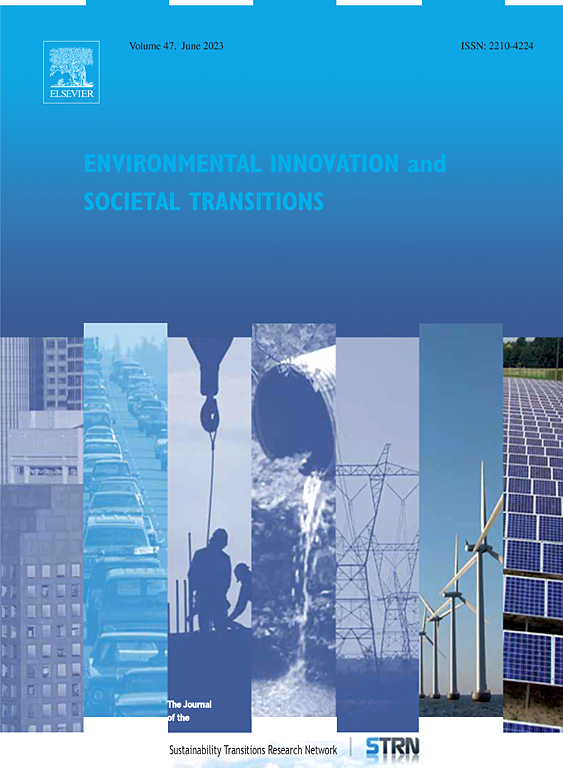Towards new perspectives of stakeholder engagement in sustainability transitions: Bringing the supranational level into view
IF 5.7
2区 经济学
Q1 ENVIRONMENTAL SCIENCES
Environmental Innovation and Societal Transitions
Pub Date : 2024-10-08
DOI:10.1016/j.eist.2024.100921
引用次数: 0
Abstract
Although stakeholder engagement is a well-discussed topic within sustainability transitions research, it is underexplored in the context of supranational actors, such as the EU, despite the apparent relevance. Through the case study of the European citizen and stakeholder consultations around European Green Deal (EGD), this paper investigates the implications of stakeholder engagement conducted on a supranational level. By applying a transitions-based engagement framework, gaps are highlighted in the existing knowledge of the particular supranational dynamics in engagement for sustainability transitions. The goals of engagement are entangled and point to the complexity of supranational organisations, as well as specific challenges these organisations face in engagement processes. These include challenges of overcoming scale, relevance for the citizens, as well as legitimizing their own role as a transitions actor. These distinctly supranational challenges of engagement in transitions highlight several new avenues for research. In order to play a more effective role in transitions, supranational organisations must overcome these challenges.
从新的角度看待利益攸关方参与可持续性转型:将超国家层面纳入视野
尽管利益相关者参与是可持续性转型研究中一个讨论较多的话题,但在超国家行为者(如欧盟)的背景下,利益相关者参与尽管具有明显的相关性,但却未得到充分探讨。本文通过对欧洲公民和利益相关者围绕欧洲绿色交易(EGD)进行磋商的案例研究,探讨了在超国家层面开展利益相关者参与的意义。通过应用基于过渡的参与框架,本文强调了现有知识中关于超国家参与可持续性过渡的特殊动态的差距。参与的目标错综复杂,表明了超国家组织的复杂性,以及这些组织在参与过程中面临的具体挑战。这些挑战包括克服规模、与公民的相关性,以及使自身作为转型参与者的角色合法化。这些超国家参与过渡的挑战凸显了几条新的研究途径。为了在过渡时期发挥更有效的作用,超国家组织必须克服这些挑战。
本文章由计算机程序翻译,如有差异,请以英文原文为准。
求助全文
约1分钟内获得全文
求助全文
来源期刊

Environmental Innovation and Societal Transitions
Energy-Renewable Energy, Sustainability and the Environment
CiteScore
13.60
自引率
19.40%
发文量
90
审稿时长
56 days
期刊介绍:
Environmental Innovation and Societal Transitions serves as a platform for reporting studies on innovations and socio-economic transitions aimed at fostering an environmentally sustainable economy, thereby addressing structural resource scarcity and environmental challenges, particularly those associated with fossil energy use and climate change. The journal focuses on various forms of innovation, including technological, organizational, economic, institutional, and political, as well as economy-wide and sectoral changes in areas such as energy, transport, agriculture, and water management. It endeavors to tackle complex questions concerning social, economic, behavioral-psychological, and political barriers and opportunities, along with their intricate interactions. With a multidisciplinary approach and methodological openness, the journal welcomes contributions from a wide array of disciplines within the social, environmental, and innovation sciences.
 求助内容:
求助内容: 应助结果提醒方式:
应助结果提醒方式:


